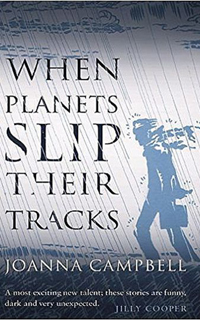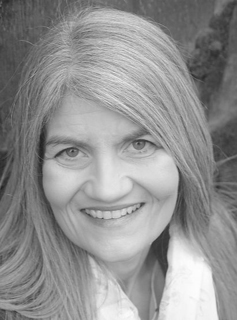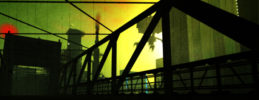
('Love' © Esther Simpson, 2015)
*
WHEN PLANETS SLIP THEIR TRACKS
by JULIA ANDERSON
When Planets Slip Their Tracks is Joanna Campbell’s collection of twenty-four short stories. It begins with the words, ‘Nate knew how to hypnotise a chicken’. Like Nate, Campbell knows how to hypnotise.
The collection takes its name from the first story, in which Carrie and Nate grow up and attend school together in Stone Gap, a mining town in the American South. Carrie is the narrator and she tells us she loves ‘the bones of that boy’. Believing the love to be one-sided, she prays Nate might love her when they are adults.
At fifteen, Carrie bears a stillborn baby. ‘…but we didn’t know a thing about that. Just saw I was looking bonny and kind of ripe in the months after the rains.’ We surmise Nate didn’t take advantage of Carrie, because their naivety is shown when he tells her they should take shelter in the cow-shed:
I swear he had no notion in his head but keeping our hides dry. Our clothes steamed in the straw, while our bodies took charge of one another.
After her baby’s burial, Carrie only feels ‘less off-course’ when she’s with Nate, especially when they go stargazing by the lake.
The more we stared with no blinking, the more stars we could see. Like they were fire-spiders pulling us inside their web, weaving us into their blue nets full of light.
I’m mesmerised by lines like these, of which there are many throughout this book.
School finishes for them. Nate gains his certificate, and ‘[a]ll the lake days and waist-high cornfield days and blue star nights went away.’ Campbell doesn’t put it down on the page that Carrie doesn’t graduate with a certificate, she lets us work this out. It dawns on us at the same time it dawns on Carrie that her and Nate’s lives will now probably proceed in two separate directions.
Carrie works three jobs spread throughout the day. Early mornings, she cleans for Aunt Lawrence, then it’s a two-mile trudge to her old school to boil dinners, and lastly, ‘Down the other side of the valley to Hardwick’s to bruise my knees wiping the butchery floor at the tail-end of a day’s slaughter’. Mr Hardwick gives Carrie rags to clean whereas he gives Sassy Clements a straw hat with silk ribbons. ‘Sassy Clements works on confectionery by the window. Other end from me. You need clean pig-tails and white petticoats for that.’
Nate has dreams for himself, ones that don’t include working down the town’s coalmine, but, for now, that’s where he works. Nowadays, the only time Carrie sees Nate is as he walks past Hardwick’s.
Now we’re grown, it’s hard to get a glimpse of Nate. When I stand up to rinse the bloodied cloths, I see him pass by. A flash of his moon-lit yellow hair on winter nights as he strides home from the coal-face.
In the summer, Nate looks in the shop and waves.
Sassy spins round and waves back. Looks at me with triumph blaring from her pebbly eyes. But, sure as slow-worms, his wave is meant for me.
One night, when Carrie is sitting out in her coop, she hears ‘the overgrown grass whisper’, and Nate’s tread on the ground. When he appears he tells her, “We can have us a marriage ceremony right here. One that the good Lord won’t see, sorry to tell you. Private for just you and me.”
For a wedding ring, Nate ‘fashioned a bit of old metal into a circle that fitted my finger fine as any ring from the fancy goods store’, and her tells her he’ll love her “even when the planets slip their tracks.”
But the story doesn’t end there. Campbell jolts us out of any cheery thoughts we might be having for the two characters. As Carrie begins pulling off her dress, Nate stops her with a gentle hand. Campbell hits us with Carrie’s thoughts: ‘And that was where our marriage had to end’.
His wedding to Sassy took place next day in a hard cloud of white rice. Day after that, he became Teller in her Pa’s bank. The baby was coming by Christmas.
 While Nate has ‘his path laid out neat’, with Sassy and their baby, and work in a Bank, Carrie remains in love with him and spends her days ‘Cleaning, boiling, toiling, kneeling’, while she wears her ‘wedding ring ’til the planets slip their tracks’.
While Nate has ‘his path laid out neat’, with Sassy and their baby, and work in a Bank, Carrie remains in love with him and spends her days ‘Cleaning, boiling, toiling, kneeling’, while she wears her ‘wedding ring ’til the planets slip their tracks’.
These two characters still haunt me as much today as when I first read their story. Campbell elicits a response from her readers by making us care about Carrie and Nate as we yearn for a happy-ever-after ending for them, one where they are together. But, because of the clever way in which Campbell has drawn them, we know it will never happen; they have such different psychological make up. Nate is proactive, a man of intention. Carrie is reactive; she allows life to happen to her.
Carrie isn’t in charge of her own destiny. For poor Carrie the events in her life are controlled by other people. Her story has been told to her and she goes along with it repeating and internalising every moment. We are left with the feeling that she would never fight Sassy Clements for Nate.
Nate, on the other hand, is in charge of his life and destiny. He decides on a course of action and follows it until he reaches his goal. He is a go-getter not a settler. He doesn’t follow the path that most of the men in Stone Gap take after school, which is to settle for a life down the mine. Instead, Nate sets clear intentions and works hard at school so that he can graduate and improve his employment prospects, which also include marrying Sassy Clements whose father owns the bank!
‘Big Day Out’ is set in the late 1950s or early 1960s in a farmhouse. It’s Tom’s Granddad’s big day out and it turns out to be a big day for Tom too – a moment some of us have experienced, but one that possibly not everyone remembers… I can, and this story brought it all back.
We first meet Tom, a young lad, and his family in their farmhouse kitchen one morning. The story is told in the third person through Tom’s eyes.
People who Passed On ate Battenberg. Journeys needed cake. Tom watched Mam slice it, waiting for the miracle of pink and yellow chequerboard.
Tom is sitting by the range, where he’s helping to revive a new-born lamb. His sister, Lily, younger by three years, is busy playing with her doll. She places it on ‘the tea-towel that served as a mattress in the turnip-crate that served as a cot’. Tom tells Lily that Battenberg is Granddad’s favourite cake when she asks Mam for a slice. Mam suddenly stops slicing and keels over the table. She instructs Tom to fetch Grandma.
He doesn’t want to go past the front room on his way to fetch Grandma because he’s hoping to avoid another glimpse of the coffin. Granddad ‘looked a bit serious in that box. Sort of waxy like a talking doll whose key had dropped out mid-sentence. He must be resting before his Big Day Out.’ This is where we realise Tom hasn’t grasped that his Granddad’s died because he wants him to wake up ‘and put his other trousers on. His stiff suit and tie smelt of cupboards, instead of Famous Grouse.’
Tom finds Grandma in the hall, busy unlocking windows. He asks her if it’s wise to leave the house unlocked while the family goes to church. “Unlocking windows sets the soul free on its journey to heaven. But I’m keeping the front bay shut. I’ll not have him floating about near Nellie Pyefinch,” she answers.
Mam cries out in pain and Grandma realises the baby must be coming. She tells Tom all the doors must now be unlocked and opened. “Unlocking doors helps the bairn’s arrival into the world.” Tom helps her but thinks women sure have mysterious ways.
I love the author’s use of many old wives’ sayings scattered throughout this story. It makes it laugh-out-loud funny, even though it’s a serious subject. Although we know these sayings are often ridiculous and contradictory, we still say them, just in case – touching wood with our fingers crossed.
Grandma now brings sayings about knives into the proceedings. In the kitchen, Mam’s still clutching onto the knife she was using to cut the Battenberg and Grandma urges her to be careful. “You know what they say. Drop a knife on the floor and the next visitor will be a man. And I’d say the midwife would be a more blessed choice, duck.”
Tom and Grandma help Mam upstairs, but Mam pauses on the top stair. “Mother, why have you brought up the cake-knife?” Grandma tells her she’s going to pop it under the bed: “Cuts the pain two.”
Unsure once more what his Grandma’s on about, Tom leaves the women ‘blethering about boiling the kettle. Lord knew why. Maybe Granddad was going to wake up soon for his cup of tea.’
 Making sure Lily doesn’t go hungry, Tom pulls a thick crust off the loaf for her. It’s the humour of this scene that reminds me how much I loved reading the Just William books by Richmal Compton, and the side-splitting Jennings series by Anthony Buckeridge, during my childhood:
Making sure Lily doesn’t go hungry, Tom pulls a thick crust off the loaf for her. It’s the humour of this scene that reminds me how much I loved reading the Just William books by Richmal Compton, and the side-splitting Jennings series by Anthony Buckeridge, during my childhood:
…buttering it to the edges the way she liked it. He wasn’t allowed to use knives, but after a rummage in the drawer for a substitute, he found the old ivory shoe-horn and that did the job just as well.
Tom’s dad comes home from the lambing; he is going to be one of the four men carrying the coffin.
Shawl-wearers, Tom thought they were called. Or something like that. But Tom can’t imagine him in anything patterned or lacy. Dad smelt of pig shite and wore the biggest boots in the valley.
But Tom hears his ‘footsteps making the floorboards bounce in the room above’. Outside, the nurse’s car judders ‘into the yard like gun fire’. The midwife rushes through the door and up the stairs. The coffin-driver from the black car arrives next, and Lily asks him if Granddad was coming to the wake and what is a wake? He explains and Tom overhears. Tom mulls over the recent events, back to when Granddad hadn’t been well. ‘He felt the truth clicking into place. Granddad wasn’t coming back afterwards. Not even for the cake. They were having the party without him.’
More commotion and shouting from upstairs follows and a baby brother is born. Tom and Lily go up. ‘The new baby’s screwed-up face, wrinkled brow and toothless mouth looked beautiful to Tom. And familiar too. Maybe Granddad had come back to them after all.’ He understood now about Passing On. ‘It really is a long hike somewhere without popping back for your tea. Not even to fetch your spare teeth. So folk are dead right to be sad.’
It is a beautiful and touching story, in which the reader knows something that the main character doesn’t. Campbell lets the realisation of death, and what it means, dawn slowly and gently on poor Tom. Rather than jolting him with an overwhelming sense of loss and panic, she lets the curtain be pulled back slowly through the story until Tom gets to the deeper truth.
‘Big Day Out’ took me back to when I was eight. My father was about to give me a piggy-back down the stairs. He told me to hang on tightly because he didn’t want to drop me in case I banged my head. “Okay, but I wouldn’t die, would I?” I asked, knowing that of course I wouldn’t, nor would someone as big and strong as my father accidentally slip or drop me. “Yes, if you hit your head hard enough. Anyone can have an accident,” he replied. “Even you? Mum? Nan and Granddad?” He nodded. “And I’d never see them again?” My father said, “No, you wouldn’t.” And just as Tom had finally understood, this was my moment for understanding about death.
Every story in When Planets Slip Their Tracks is significant; there is nothing weak or wordy here. Jilly Cooper was right when she wrote her endorsement for the collection: ‘These stories are funny, dark and very unexpected.’ Every one of the twenty-four short stories tugged on all of my emotions, from the humorous ‘Half-Price Mondays with Hélène’, to the hard-hitting ‘Quiston Avenue’, to my favourite, ‘Solid Orange Sea’, which had me laughing and crying. I’ll let one of Joanna Campbell’s characters, the unnamed narrator in ‘The Invitation’, have the final word on how I feel about this hypnotising book: ‘Like a bit of birthday and a bit of dentist rolled up together.’
~
Julia Anderson writes short stories, flash fiction, poetry, essays and features. She’s been published in the Words with Jam anthology and in a range of magazines. She’s been placed first, second or third in several competitions and also shortlisted or longlisted in quite a few more. Currently, she’s set herself a challenge to write mainly happy or humorous fiction instead of writing about her usual topics containing mostly sad, bad, or mad characters. For this, she feels sure that many competition judges and editors will be grateful and that she’ll feel more cheerful herself. Following Ray Bradbury’s advice to all writers, she reads one poem, one essay, and one short story every day. (As well as all the other books and magazines she has on the go, which are of course, scattered all around the house.)

